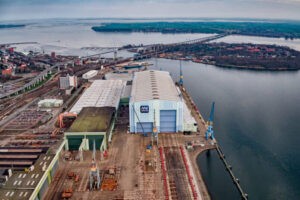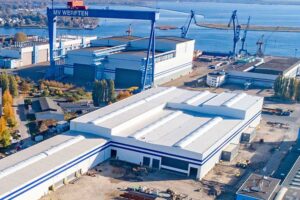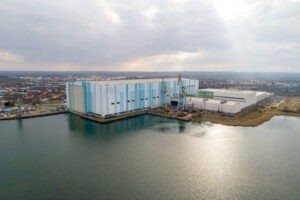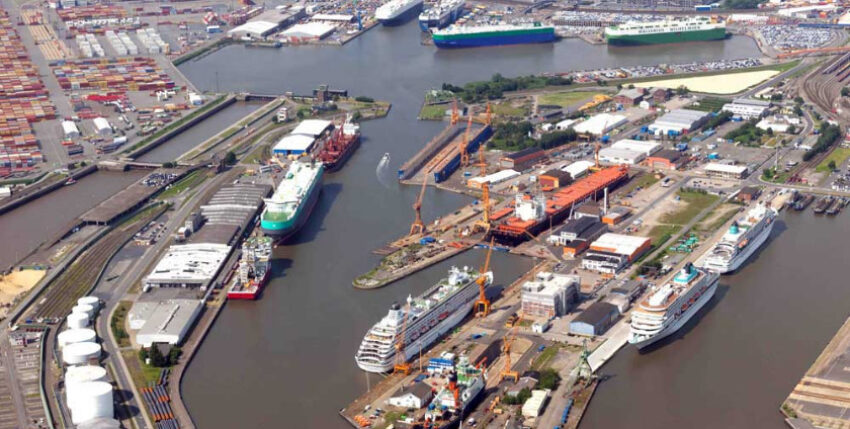For a few years, it seemed as if the Hong Kong-based Genting Group would be a saviour in times of need for some German shipyards. However, following the company's bankruptcy, the tenderloins are being divided up.
The Genting bankruptcy, which began in 2020 and led to the insolvency of the MV shipyard group with sites in Wismar, Warnemünde and Stralsund as well as the Lloyd Werft shipyard in Bremerhaven in March 2022, was the biggest dilemma for the industry in the post-war period after the Bremen Vulkan disaster in 1995/96.
First of all, it should be noted that after a long period of uncertainty, the situation has regained some shape, mainly thanks to the insolvency administrator, and future prospects are becoming clearer. For German shipbuilding, a short era has come to an end with a big bang. It had all started promisingly when the Malaysian Genting Group, through its company Genting Hong Kong, initially bought the Lloyd Werft shipyard in Bremerhaven and, shortly afterwards, the shipyards in Mecklenburg-Vorpommern, which were in difficulties, and merged the latter into MV Werften. The background to this was that the Genting Group was unable to find any contractors for the expansion of its cruise lines Star Cruises, Crystal Cruises and Dream Cruises for its planned newbuilds due to the booming global cruise business at the time and therefore acquired the German shipyards without further ado.
Although these companies had been in rough seas after several changes of ownership, the development came as a surprise. However, it was welcomed across the board, in some cases even euphorically. This was particularly true for the shipyard employees, who once again saw prospects for themselves, and for the federal state of Mecklenburg-Vorpommern, whose industrial core was formed by the shipyards. There were no longer any worries about new orders, as the demand from Genting's own shipping companies was high enough. The impetus for the local supplier and construction industry should not be underestimated either, as the new owner invested heavily in order to customise the shipyards and their surroundings to its needs.

And so things progressed until the coronavirus pandemic changed the world at the end of 2019. This caused a painful break in the cruise business. The Genting Group and its German shipyards were also severely affected. From March 2020, production was discontinued at all sites and at the beginning of 2022, the Bremerhaven district court opened insolvency proceedings for Lloyd Werft and shortly afterwards the Schwerin district court for MV Werften GmbH. Most of the approximately 2,000 employees were transferred to a transfer company. Only around 200 shipbuilders and engineers remained on site to secure the sites technically. Now the work of insolvency administrator Christoph Morgen and his team from the Hamburg law firm Brinkmann & Partner began. What they achieved within a year is worth recording.
Lloyd Werft in Bremerhaven, with which Genting's German involvement began in September 2015, had to file for insolvency on 10 January 2022. New owners were found in March following a bidding war with the consortium formed by the two local entrepreneurs Zech and Rönner. Both had initially submitted separate bids, but then joined forces to outbid a third interested party from Abu Dhabi. This "Bremen solution" had also been worked towards behind the scenes. In contrast to the Arab bidder, who primarily wanted to build, repair and maintain yachts in Bremerhaven and take over the entire workforce, Zech and Rönner intend to continue using only part of the site for shipbuilding, for example for repairs to cruise ships. The aim was to work closely with the Bredo shipyard, which belongs to Rönner. In the northern part of the site, around the large docks, other trades were to be established in a kind of maritime industrial park.
In Mecklenburg-Western Pomerania, a solution was also quickly found for the MV Werft Stralsund shipyard. Back in February 2022, the city of Stralsund quickly acquired the site, including the shipyard halls, facilities and equipment on it, with the aim of establishing a "Maritime Industrial and Commercial Park Volkswerft" and creating or retaining at least 1,000 jobs. The project worked. The first tenant was the Stralsund-based company Ostseestaal at the beginning of April, which used the opportunity to significantly expand its operations. Ostseestaal specialises in the construction of electric ferries and supplies parts for yacht building. The keel has already been laid for the first newbuilds in the new operating area, including an electric car ferry for the Lübeck public utility company. Shipbuilding therefore continues, albeit on a smaller scale.

in Rostock, Photo: MV Werften
The commitment of the Norwegian company Fosen Yards, which leased an extensive area with the large shipbuilding hall as well as offices and open spaces and founded Fosen Yard Stralsund GmbH as a separate company on 1 June, promised more in this respect. Ships are to be built, repaired and refitted again. However, no conclusive concept has yet been announced. Negotiations are rumoured to be underway regarding a replica of the CRYSTAL ENDEAVOR, which was the only newbuilding to be delivered to a Genting shipping company under the management of MV Werften in Stralsund and was sold to the Royal Caribbean cruise group by court order in Gibraltar in mid-July. German Sustainables GmbH was the third company to sign a lease agreement on 15 July. A new generation of wind turbines is to be built on an area of 6000 square metres on the former shipyard site.
The large shipyard in Wismar was awarded to the shipbuilding group Thyssenkrupp Marine Systems (TKMS) following a lengthy, open investor process. According to the insolvency administrator, submarines or other naval units could be built there from 2024. The shipyard has a covered building dock with a hall that is 72 metres high, 155 metres wide and 395 metres long. According to the insolvency administrator, the future order situation is decisive for the necessary investments in upgrading to naval shipbuilding and for the employment of staff. "The more orders, the more jobs." TKMS did not specify an exact number. If production ramps up in the course of 2024, around 800 employees could be hired, it said. If additional orders are received in the surface area, the number could increase to 1,500. If there is a need to hire new staff, this will primarily be covered by the transfer company that has been set up for former employees of MV Werften.
MV Werften Fertigmodule Property GmbH, also based in Wismar, has been acquired by the globally active Hamburg-based Eppendorf Group. It is building a new plant there for high-quality laboratory consumables made from functional high-tech plastics. The site comprises more than 20,000 square metres of floor space with production halls and warehouses. The start of production has been announced for the end of 2022.
A buyer has also been found for the Park Inn by Radisson hotel operated by MV Werften in Wismar. According to the insolvency administrator, a Hamburg-based family business has taken over the operating and property company, including all employees.
Most recently, there was also movement in Rostock in June. The federal government prevailed in a bidding process for the large MV Werft Rostock shipyard. Following approval by the budget committee of the German Bundestag, the Federal Real Estate Agency (BIMA) took over the shipyard in order to lease it and the 65-hectare site to the navy. The Warnemünde Hohe Düne base, home port of the 1st Corvette Squadron, is located in the immediate vicinity of the shipyard. Following a corresponding technical upgrade from the 100 billion euro special fund for the Bundeswehr, a second arsenal operation will be established on the Warnow alongside the one in Wilhelmshaven. Among other things, the shipyard has a large dry dock. Around 500 of the former MV employees are to be kept on. However, the facilities must first be cleared out. This includes the removal and recycling of more than 17,000 tonnes of steel that have already been used for the GLOBAL 2 cruise ship, the sister ship of the unfinished GLOBAL DREAM in Wismar.

The inspector of the navy, Vice Admiral Jan C. Kaack, sees the establishment of a new naval arsenal in Warnemünde as a huge opportunity. This substantial strengthening of maintenance capacities will enable a lasting turnaround in this area. The German Navy needs this turning point as quickly as possible. Mecklenburg-Western Pomerania's Minister of Economic Affairs also welcomed the takeover by the federal government, as "the award of the contract creates a long-term perspective for local people that secures jobs."
The engineering firm Neptun Ship Design, which was acquired by MV Werften at the beginning of 2019, is also part of the Rostock site. The 100 employees have now been taken over jointly by the shipbuilding company Fassmer and Meyer Werft. It will remain independent and continue to work within the existing structure.
This left only the giant cruise ship GLOBAL DREAM, which is 75 per cent complete in the building dock at the Wismar shipyard. It was ordered by Genting Hong Kong itself and designed for the Chinese market. 1.3 billion euros had already been invested in the ship, and a further 700 million euros were still needed to complete it. With 208,000 GT and a capacity of up to 9,500 passengers in 2,500 cabins, it would have been the largest cruise ship in the world. For a long time, it was rumoured that if no buyer could be found for the giant, it would have to be demolished on the spot. However, efforts to sell the ship proved to be extremely difficult due to the precarious situation in the cruise industry caused by the coronavirus pandemic. Where else could it be used? Time was of the essence, as the building dock had to be cleared by the end of 2023. But the prospect of a bargain attracted interested parties. The purchase agreement with the American Disney Cruise Line was finally signed in mid-November, providing for the completion of the ship after extensive conversions and extensions by Meyer Werft. Several hundred former MV Werft employees, reinforced by experts from Papenburg, will now finish building the GLOBAL DREAM in Wismar for the American market by 2025.
Despite these successes, the work of insolvency administrator Christoph Morgen is far from over. He expects that it will take another five years or so to finalise the remaining details. According to Morgen, all assets and debts must be clarified. Every single claim will be scrutinised in order to correctly distribute the money collected during the insolvency proceedings.
Hans Jürgen Witthöft







